Holzkirchen: Small in Size, Big on Experience Past Review
By Divesh B (Math, University of Arkansas - Fayetteville) for
University of Kansas: Holzkirchen - Advanced German Language at Freunde der Universitat Kansas
The experience was very worthwhile, and I would encourage language students to pursue such a program to broaden their vocabulary and understanding. I am know more interested in language study than ever, and I am considering linguistic study, namely of Germanic languages, in the future.
Review Photos
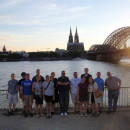
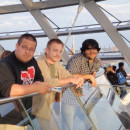
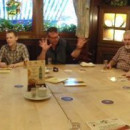
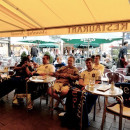
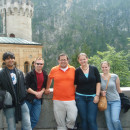
Personal Information
| If you took classes at multiple universities, list those universities here: | Advanced Grammar 1, Literature, German Civilization |
| How much international exposure did you have prior to this program? | 1 month - 6 months |
Review Your Program
|
* Overall educational experience
Academic rigor, intensity, resources, etc. |
The workload was manageable, though the classes are definitely not blow-off. One must do the work whole-heartedly and completely, even though the professors know that study abroad students are new to the atmosphere and give some leeway since being abroad is a lesson on its own. The grading system was very fair. The teaching system was not that much different from those in the US, and all classes are taken with fellow study abroad students, so adjustment is not too difficult. |
|
* Host Country Program Administration
On-site administration of your program |
The only aspect I was unsure of at the school was library resources, although we had access to internet in the computer labs for research. Overall, the program was administered quite well. One had plenty of free time to balance homework and leisure activities. Program size was convenient, as all classes consisted only of the study abroad participants. The program would have been better if some of the course offerings were a bit more challenging, as in the grammar course. |
|
* Housing:
How satisfied were you with your living arrangements? |
Food was provided by the host family on most days, basically, whenever one did not have group meals or lunch at the school cafeteria. Anytime we had group activities, meals were provided on KU's tab (included in the program fee) and they were usually excellent. Otherwise, we had lunch at the school cafeteria on days we had class, and one would usually work with one's host family to arrange other meals or buy one's own meals. Nothing was required to be purchased by the student for meals. Host families were assigned to us by our professor from KU. All host families were in reasonable distance to the school, and we were provided a metro ticket for the month of July to take the rail to Munich whenever we wanted. Safety was not a concern at all; the town of Holzkirchen is very safe. |
| * Food: |
Availability of food was not an issue at all. We were provided plenty of it on trips and during our stay with host families, unless one found the meals with our host families unsatisfactory. Each family was different, so one had to work it out with his/her specific family. |
|
* Social & Cultural Integration:
How integrated did you feel with the local culture? |
There were NUMEROUS events we were able to partake in on the trip. The Berlin World Cup Fan Mile, Kölner Dome, Mayschoss winery, Neuschwanstein Castle, traditional German folk dancing, Oberammergau passion play, and numerous museum visits were just some of the many activities available. This is what made the program so enjoyable. |
|
* Health Care:
How well were health issues addressed during the program? |
|
| * Safety: |
|
| If you could do it all over again would you choose the same program? |
Yes
|
Finances
|
* Money: How easily were you able to live on a student's budget?
(1 = not very easy/$200+ on food & personal expenses/week, 2.5 = $100/week, 5 = very easily/minimal cost) |
|
| Not including program expenses, about how much money did you spend on food and other expenses each week? | I did not have to spend much money on food as most meals were provided, and my personal spending varied from each week depending on what I was doing. On weekends when I traveled, I obviously spent more money. On average, however, I spent about 20-30 Euros on food and about 50 Euros on personal expenses. One should note that we were provided pocket money (40-60 Euros per week) by the program to cover any meals not provided by host families or the school cafeteria or group meals. |
| Do you have any general money-saving tips for future study abroad participants? | Just be prepared to spend money on extraneous things at your own discretion. If you intend to take short trips on weekends or buy souvenirs and gifts, make sure you budget for that. Otherwise, most other things are covered by the program. |
Language
| * Did your program have a foreign language component? | Yes |
| How would you rate your language skills at the beginning of the program? | Intermediate |
| What was the highest level language course you had completed prior to departure? | Conversation and Advanced Grammar |
| If applicable, to what degree did your living situation aid your language acquisition? |
|
| Language acquisition improvement? |
One could practice language skills with professors, fellow US students, German students, and especially with host families. The entire purpose of living with host families is to continually develop the language and broaden its usage. Although many people did speak English, we were always encouraged to use German in our everyday activities. It is ultimately up to the student to interact with his/her host family and others in German to improve his/her language skills. One should not just sit around at home alone doing "normal" activities; one must be actively engaged! |
Other Program Information
|
* Where did you live?
Select all that apply |
|
|
* Who did you live with?
Select all that apply |
|
|
* Who did you take classes with?
Select all that apply |
|
A Look Back
| * What do you know now that you wish you knew before going on this program? | If you're a language person at all, especially in Germanic languages and culture: do it. |








